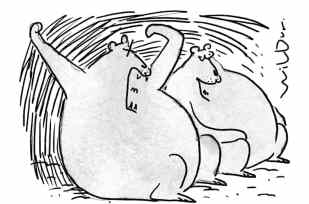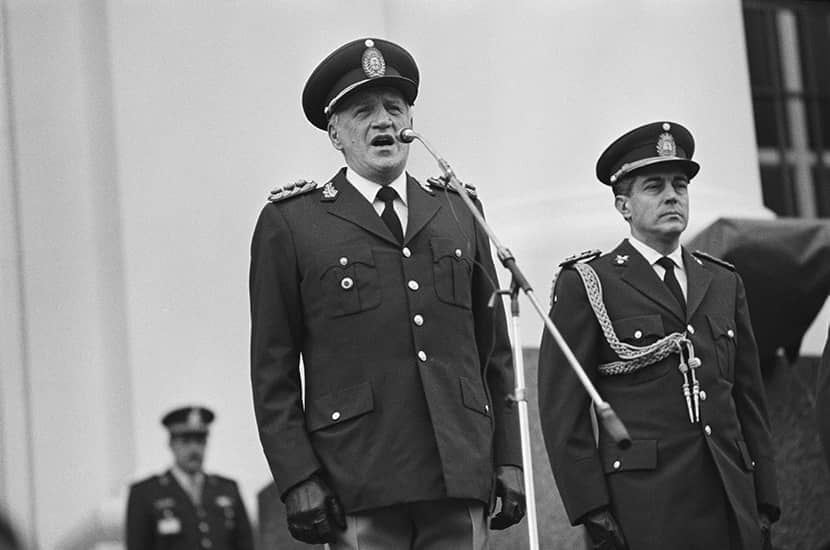A bully-boy leader. A corrupt, out-of-touch regime. A twisted reading of history. An unprovoked, military-led landgrab. A domestic disinformation blitz. And an enemy that, contrary to all the aggressor’s expectations, fought back. We’ve been here before. Not on the scale of Russia’s attack on Ukraine perhaps, nor with the tragic cost to civilian lives. But wind back 40 years and something akin to Putin’s demented assault played out in the South Atlantic.
In the last throes of a desperate government, Argentina’s military dictatorship ordered an assault on the Falkland Islands. When the news broke in early April 1982, the world gaped. Sabre-rattling from Buenos Aires was nothing new. But an actual invasion? Few believed it could ever happen.
As Argentine troops were raising their flag over the disputed territories (under British rule since 1833), the television reporter Julian Manyon was covering another war, this time in El Salvador. With a journalist’s relish for action, he and his ITV production team duly dropped everything and jumped on the first plane to Argentina. It proved a fateful decision. Soon afterwards, Manyon found himself being grabbed off the street, bundled into the back of a Ford Falcon and driven to the scrubby outskirts of the capital.

What followed was surreal. The henchmen of a murderous regime eventually credited with butchering up to 25,000 ‘subversives’ during its seven-year rule let Manyon and his production-team colleagues go. ‘Instead of lying in pools of blood after the sort of execution that had taken place so often in Argentina,’ the veteran British newsman recalls, ‘we were standing near-naked in a field, in the middle of a country at war with Britain.’
It gets weirder. After they found their way to a police station, a ministerial car was sent to pick them up. And then, just a few hours after their abduction, they were being greeted in the presidential palace by the head of the military junta himself, an effusively apologetic General Galtieri. A midnight dinner of steak and Malbec wine with the interior minister followed, and then Manyon was on a plane home. One month and hundreds of deaths later, Port Stanley would be back in British hands and Argentina’s discredited junta would be heading for the door.
As journalistic war anecdotes go, Manyon has himself a goodie. News of the kidnapping made international headlines and, arguably, cemented public opinion about the despotism of Argentina’s dictatorship. But even by his own admission, his was only a ‘bit-part in the drama’.
Argentina’s junta oversaw as many as 20 clandestine torture centres in Buenos Aires alone
He got on with his life and forgot about it. So why the book? The answer lies in a decision by Barack Obama to declassify thousands of CIA files from the period. With admirable tenacity, Manyon throws himself back into the fray. What emerges is a fascinating picture of a dictatorial regime lost in its own perverted logic – a logic that led its leaders to believe that Britain would not defend ‘a few remote islands’ and, if she did, that the United States would come to its aid.
Again with echoes of Putin’s Russia, Kidnapped by the Junta reveals the blinkered ideological extremism that comes from the systematic suppression of political opposition. In the febrile, paranoid atmosphere of Argentina, no alternative views could be brooked. The result? ‘Delusions flourished.’
Manyon’s journalistic background has taught him the value of character-led storytelling. Enter Aníbal Gordon, a sadistic-minded petty criminal turned fully paid-up kidnapper, torturer and serial murderer. He also had a penchant for art, fitting in multimillion-dollar museum heists in his spare time. Argentina’s junta oversaw as many as 20 clandestine torture centres in Buenos Aires alone. In his role as a secret intelligence agent, Gordon ran the now notorious Automotores Orletti unit, housed in a former mechanics workshop. A large portrait of Adolf Hitler hung on one wall, a dartboard with a picture of Che Guevara on another. The bloodletting took place in the basement. The gruesome goings-on are, by their nature, sketchy.
As the CIA documents make clear, it was Gordon and his mob who almost certainly nabbed Manyon. In the dying days of the junta, the ill-advised kidnapping of a high-profile magazine owner would see Gordon imprisoned. He died soon afterwards, of a ‘heart attack’.
The great skill of Kidnapped by the Junta is to put Gordon’s blood-soaked career in its wider political context. For all their rhetoric of restoring order and stability, Argentina’s military leadership endorsed a regime in which such men flourished.
It is impossible to read this striking retelling of the Falklands War without thinking of the current conflict in Ukraine. Not all the parallels are the same. For one, the aggressor today is much better armed. Argentina had five Exocet missiles; Russia reportedly has 5,977 nuclear warheads. Yet if this gripping account teaches anything, it is the folly of tyrannical regimes believing they can act with the same violence and impunity abroad as they do at home – although who, least of all dictators, learns from history?






Comments